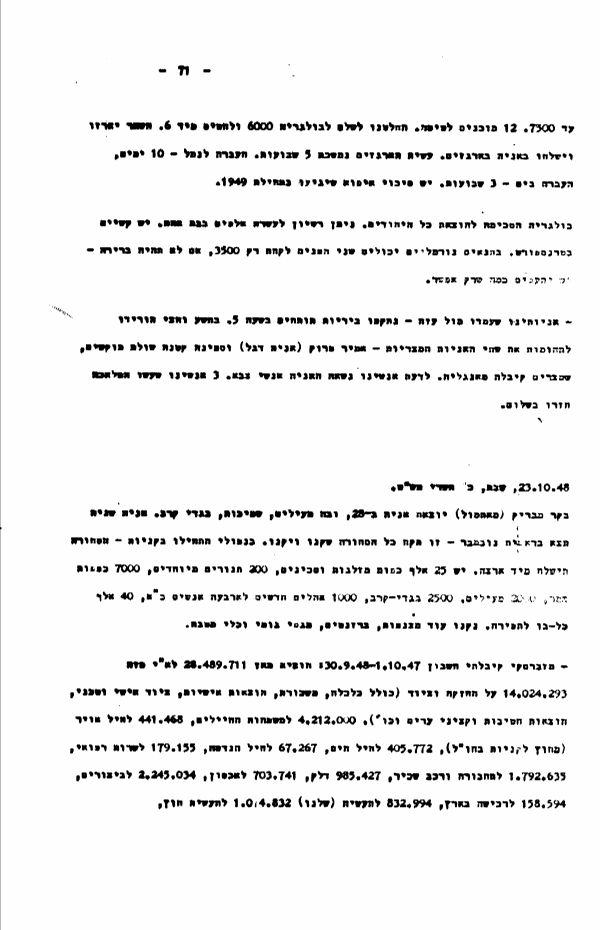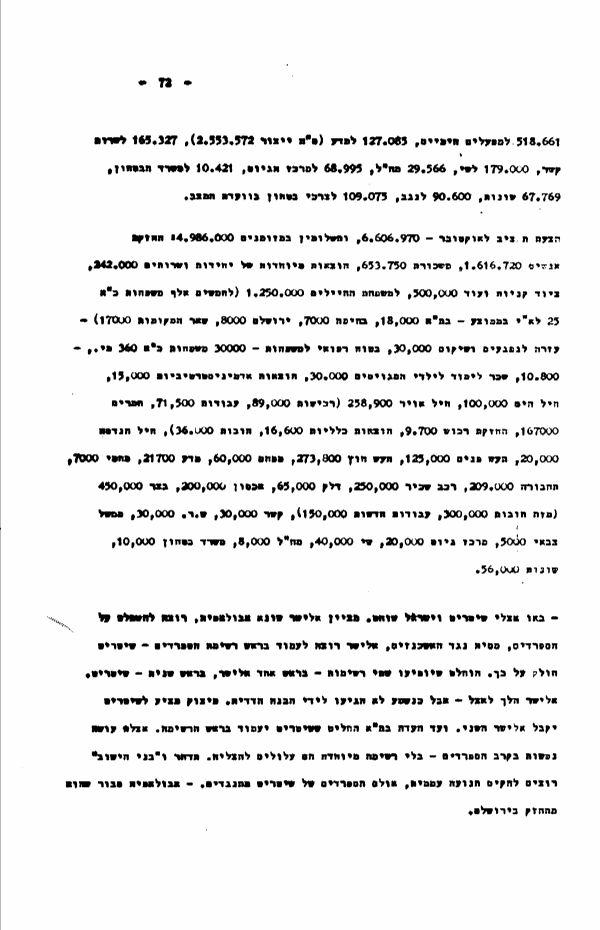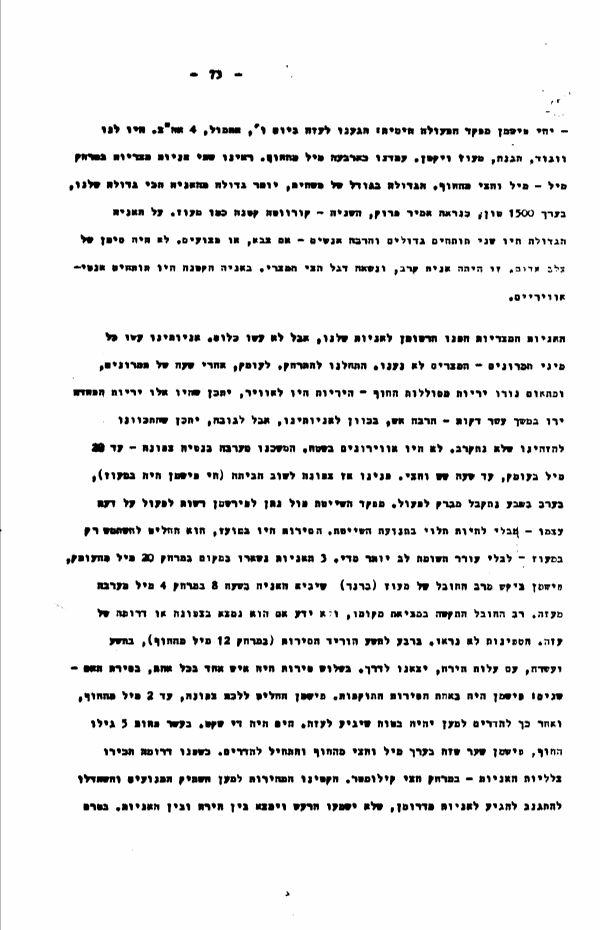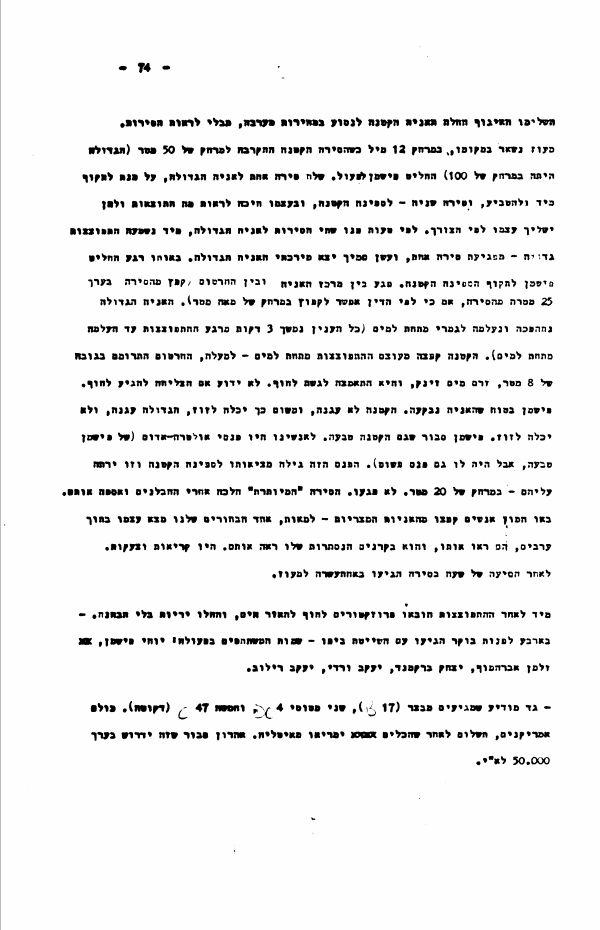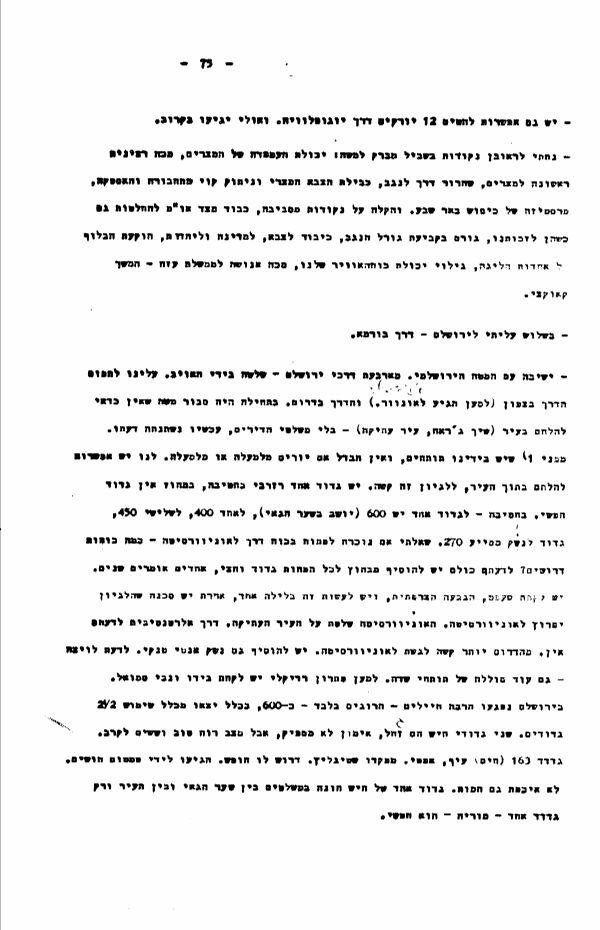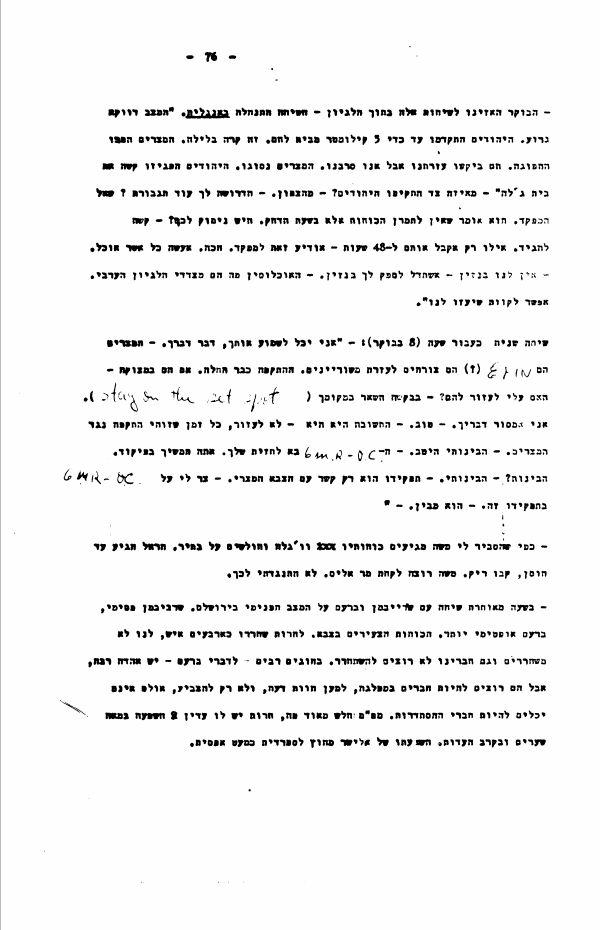1
of
Places:
Be'er Sheva
Havana
Haifa
Naples
Barak
Gaza
Tidhar
Otsem
Jaffa
Egypt
Bethlehem
Bar'am
Har'el
H̠osen
Jerusalem
Yugoslavia
Burma
Hebron
The use of the photograph is subject to the Copyright Law, 2007
22.10.1948
224893
Saturday, October 23, 1948 [Aharon] Becker cables (yesterday): A ship is departing on the 28th [of this month], carrying coats, blankets, and battle fatigues. A second ship will depart at the start of November – it will carry all the merchandise that was bought and will be bought. They started making purchases in Naples – the merchandise will be sent to the country immediately. There are 25,000 spoons, forks, and knives, 200 special stoves, 7,000 woolen gloves, 2,000 coats, 2,500 battle fatigues, 1,000 new tents for four men each, 40,000 sewing kits [?]. More helmet coverings [?], tarps, rubber boots, and kitchen equipment were bought. – Zabrasky submitted a financial statement [for 12 months] 1.10.47 – 30.9.48: in that time he spent P£ 28,489,711, of which 14,024,293 [was spent] on upkeep and equipment (including subsistence, salary, personal expenses, personal and technical equipment, expenses of brigades and city commanders, etc.). 4,212,000 for soldiers’ families, 441,468 for the air force (aside from purchases abroad), 405,772 for the navy, 67,267 for Engineering Corps, 179,155 for medical service, 1,792,635 for transport and rental vehicles, 985,427 fuel, 703,741 for housing, 2,245,034 for fortifications, 158,594 for in-country procurement, 832,994 for (our) manufacturing, 1,074,832 for foreign manufacturing, 518,661 for chemicals facilities, 127,085 for science (total production 2,553,572), 165,327 for signal service, 179,000 for SHAI [Information Service, i.e., intelligence], 29,566 MAHAL [enlisted volunteers from abroad], 68,995 for the recruitment center, 10,421 for the Ministry of Defense, 67,769 miscellaneous, 90,600 for the Negev, 109,075 for defense needs in the Situation Committee. Proposed budget for October [should be: November] – 6,606,970, and payments in cash 4,986,000: personnel upkeep 1,616,720, salaries 653,750, special expenses of units and services 242,000, equipment[,] purchases etc. 500,000, for soldiers’ families 1,250,000 (for 50,000 families P£ 25 each on average – in Tel Aviv 18,000, in Haifa 7,000, Jerusalem 8,000, elsewhere 17,000) – assistance for the wounded and rehabilitation 30,000, medical insurance for families – 30,000 families 360 mi. each, – 10,800, tuition for the children of conscripts 30,000, administrative expenses 15,000, navy 100,000, air force 258,900 (purchases 89,000, work projects 71,500, materials 167,000, upkeep of assets 9,700, general expenses 16,600, debts 36,000), Engineering Corps 20,000, domestic Ta’as [weapons manufacturing] 125,000, foreign Ta’as 273,800, chemicals factories 60,000, science 21,700, [Mahmi?] 7,000, transport 209,000, rental vehicles 250,000, fuel 65,000, housing 200,000, fortifications 450,000 (of which debts [amount to] 300,000, new projects 150,000), signal 30,000, M.S. [medical service?] 30,000, military government 5,000, recruitment center 20,000, SHAI 40,000, MAHAL 8,000, Ministry of Defense 10,000, miscellaneous 56,000. – [Bechor] Sheetrit [minister of police and minorities] and Israel Shochat came to see me. [He] notes: [Eliyahu] Elyashar hates [David] Abulafia, wants to take control of the Sephardim, incites against Ashkenazim. Elyashar wants to be at the top of the Sephardic list [of candidates for elections] – Sheetrit disputes this. It was decided that there will be two lists – Elyashar at the top of one, Sheetrit – at the top of the other. Elyashar went to ETZEL but after he was heard they didn’t reach a mutual understanding. [Menahem] Pishton suggests that Sheetrit accept Elyashar as the second [name on his list]. The [Sephardic] community committee in Tel Aviv decided to have Sheetrit at the top of the list. ETZEL is garnering support among the Sephardim – without a special [Sephardic] list they might succeed. [David] Tidhar and Bnei HaYishuv want to establish a popular movement, but Sheetrit’s Sephardim are opposed. Abulafia believes that he’s growing stronger in Jerusalem. – Yohai Fishman (Ben-Nun), commander of the naval action: We reached Gaza on Friday, yesterday (October 22), 4 p.m. We had [the ships] Wedgewood, Haganah, Maoz, and Yaktan [sp.]. We stood about 4 miles from the shore. We saw two Egyptian ships at a distance of a mile – a mile and a half from the shore. The larger one was the size of a destroyer, larger than our largest ship, about 1,500 tons, apparently the Emir Farouk, the second one – a small corvette like the Maoz [in fact – a minesweeper]. The larger ship had two large cannons and many men – army personnel, or wounded. There was no Red Cross sign. This was a battleship, and it carried the flag of the Egyptian navy. The small ship had anti-air cannons. The Egyptian ships turned their bows towards our ships, but didn’t do anything. Our ships undertook all sorts of maneuvers – the Egyptians didn’t respond. We started to move away towards deep [waters], after an hour of maneuvers, and suddenly shots were fired from the coastal batteries – the shots were into the air, these might have been shots meant to frighten[;] they fired for 10 minutes – a lot of gunfire, in the direction of our ships, but upwards, possibly meant to warn us not to come close. There were no airplanes in the vicinity. We continued westward with an inclination to the north – up to 20 miles in the deep [waters], until 6:30. Then we turned northward to return home (Yohai Fishman was on the Maoz), [and] at seven we received a cable to take action. The flotilla commander Paul [Shulman] gave Fishman permission to act at his own discretion – without being dependent on the flotilla’s movement. The boats were on the Maoz; he decided to use only the Maoz – without drawing too much attention. The 3 ships stayed in place for the distance of 20 miles in the deep [waters]. Fishman asked the Maoz Captain ([Mila] Brenner) to bring the ship at 8 o’clock to a distance of 4 miles west of Gaza. The captain had trouble finding his location, and didn’t know whether he was to the north or to the south of Gaza. The ships were not visible. At a quarter to nine he lowered the boats (at a distance of 12 miles from the shore); at 9:10, with the rising of the moon, we set out. Three boats had one man in each, the mother boat – two: Fishman was in one of the attack boats. Fishman decided to go north, up to 2 miles from the shore, and then head south in order to be sure he reaches Gaza. The sea was pretty calm. At 5 to 10 they found the shore, Fishman estimated that this was about a mile and a half from the shore, and he started to head south. When they turned south, they recognized the silhouettes of the ships – at a distance of half a kilometer. They reduced speed in order to silence the motors and tried to sneak up on the ships from their south, so they wouldn’t hear the noise, and would be between the moon and the ships. Before they completed the flanking maneuver, the small ship began speeding westward, without seeing the boats. Maoz stayed in place, at a distance of 12 miles; when [our] small boat came within a distance of 50 meters (the large one [the last one?] was at a distance of 100), Fishman decided to act. He sent one boat to the large ship, in order to attack immediately and sink it, and a second boat – to the small ship – and he himself waited to see what would result and where to insert himself as needed. By mistake both boats approached the large ship, immediately a huge explosion was heard – from a strike by one boat, and thick smoke started coming out of the stern of the large ship. At that moment Fishman decided to attack the small ship. He struck between the center of the ship and the bow (he jumped from the boat about 25 meters from the boat [should be: ship], although by law it’s possible to jump at a distance of 100 meters [?]). The large ship turned over and completely disappeared underwater (the whole thing lasted 3 minutes from the moment of explosion until the disappearance underwater). The small one sprang up from the force of the underwater explosion – upwards, the bow rose up to a height of 8 meters, a gush of water burst forth, and it struggled to reach the shore. It’s not clear whether it succeeded in reaching the shore. Fishman is sure that the ship cracked open. The small one hadn’t dropped anchor, and therefore could move; the large one was anchored, and couldn’t move. Fishman thinks that the small one also sank. Our men had ultrared flashlights (Fishman’s sank, but he also had a simple flashlight). This flashlight revealed the location of the small ship, which had fired on them – at a distance of 20 meters. They didn’t hit. The “locating” boat [the mothership] went after the saboteurs and picked them up. They saw many people. [People] were jumping from the Egyptian ships – [up] to hundreds. One of our men found himself among Arabs, they didn’t see him, and he with his invisible rays [night vision?] saw them. There were shouts and cries. After sailing about an hour in the boat they reached the Maoz at eleven. Immediately after the explosion projectors [spotlights] were brought to the shore to light up the sea, and indiscriminate gunfire began. At 4 a.m. they arrived with the flotilla in Jaffa. The names of those who participated in the action: Yohai Fishman, Zalman Abramov, Yitzhak Brookman, Ya’akov Vardi, Ya’akov Ritov [sp.]. – Gad [Pinchas Sapir] reports that [the following] are arriving [in Italy, en route to Israel:] a Fortress (B-17), two C-4 [Skymaster] planes, and five C-47 (Dakota) [planes], all American. Payment after the instruments take off from Italy. Aharon [Remez] thinks this will require about P£ 50,000. – There’s also a possibility of flying 12 “Spits” by way of Yugoslavia, and they might arrive soon. – I gave Reuven [Shiloah] points for a cable to Moshe [Sharett]: the Egyptians’ resilience, a severe first blow to the Egyptians, freeing a path to the Negev, containing the Egyptian army [in the Faluja “pocket”] and severing the lines of transport and supply, the prestige of conquering Beersheva and relief for the surrounding settlements, the UN upholding resolutions even when they benefit us, a factor in determining the fate of the Negev, respect for the army, the state, and Judaism, denouncing the bluff of unity in the League, discovery of our airpower, a fatal blow to the Gaza government – Qawuqji’s continuation [continuing efforts?]. – At three I went to Jerusalem – via the Burma Road. [Jerusalem] – Meeting with the Jerusalem staff. Of the four ways [directions] to Jerusalem – three are in the hands of the enemy. We must capture the road in the north [to Ramallah] (in order to reach the university) and the road in the south [to Bethlehem]. At first Moshe [Dayan] thought it wasn’t a good idea to fight in the city (Sheikh Jarrah, the Old City) – without the strongholds along the way; now he’s changed his mind, because: we have cannons, and it doesn’t matter whether the gunfire is from above or above [should be: above or below]; we have the possibility of fighting within the city, [but] for the Legion this is hard; there’s one reserve battalion in the brigade, [but] there’s no free district [garrison] battalion. In the brigade, one battalion has 600 (stationed at Sha’ar HaGai), one has 400, a third has 450, auxiliary weapons battalion 270. I asked: If we must forcefully forge a path to the university [to Mount Scopus] – how many forces are needed? In everybody’s opinion, at least one and a half battalions should be added from outside, some say two. [We] should take Shu’afat, the French Hill, and this should be done in one night, otherwise there is a risk that the Legion will breach the university. The university overlooks the Old City. There’s no alternative way in their view. From the south it’s harder to reach the university. Anti-tank weapons should also be added. In Levitze [Yitzhak Levi]’s view – another battery of field cannons as well. For a radical solution [we] should take Biddu and Nebi Samwil. Many soldiers were hurt in Jerusalem – just those killed [amount to] about 600, [and] in total 2½ battalions have been taken out of use. Two Hayish battalions are GAHAL [foreign recruitment], without enough training, but good spirits and eager for battle. Battalion 163 (garrison) is tired, apathetic (its commander is [Ya’akov] Stiglitz [Eshed]), needs a break. They’ve reached the point of losing their minds. Don’t even care about death. One Hayish battalion is stationed in strongholds between Sha’ar HaGai and the city, and only one battalion – Moriah – is free. – This morning [our side] eavesdropped on these conversations within the Legion – the conversation was conducted in English: “The situation is actually terrible. The Jews advanced up to 5 kilometers from Bethlehem. This happened at night. The Egyptians violated the truce. They asked for help but we refused. The Egyptians retreated. The Jews fiercely bombarded Beit Jala. “From which side did the Jews attack? – From the north. “Do you need more reinforcement? – asked the commander. He says the forces should not be mobilized unless it’s crucial. Is there a reason for this? “It’s hard to say. If I could just have them for 48 hours. “I’ll inform the commander of this. Wait. I’ll do everything I can. “We don’t have gasoline. – I’ll try to provide you with gasoline. “The population here are supporters of the Arab Legion. Hopefully they’ll help us.” A second conversation about an hour later (8 a.m.): “I can hear you; go ahead. “The Egyptians [at Mount Hebron] are En Fin (?) [French: at the end]. They’re crying out for help from armored vehicles. The attack has already begun. If they’re in distress – should I help them? “Please stay on the set (?) spot (?). I’ll convey your remarks.” – Good. “The answer is – not to provide help, as long as this is an attack against the Egyptians. “I fully understand. “The O. C. 6 M. R. [Officer Commanding 6 Mechanized Regiment] is coming to your front. You’ll continue to command. Do you understand? “I understand. “His role is only as liaison with the Egyptian army. “I’m sorry about the O. C. 6 M. R. being in this role. “He understands.” – As Moshe [Dayan] explained to me, our forces are reaching Walaja and are taking over Battir. Harel reached Husan; the tomb [of al-Khader] is empty. Moshe wants to take Mount Elias [the monastery south of Ramat Rahel]. I didn’t object to this. – A late-night conversation with Schraibman [Reuven Shari] and [Moshe] Baram on the internal situation in Jerusalem. Schraibman is pessimistic; Baram is more optimistic. The young forces [are serving] in the army. Herut has had about 40 men released; we aren’t receiving releases and our members don’t want to be released either. In many circles – according to Baram – there’s a lot of support, but they want to be party members when it comes to voicing an opinion, not just voting, although they can’t be Histadrut members. Mapam is very weak here; Herut still has influence in Meah She’arim and among the [ethnic?] communities. Elyashar’s influence outside of the Sephardim is almost nonexistent.





